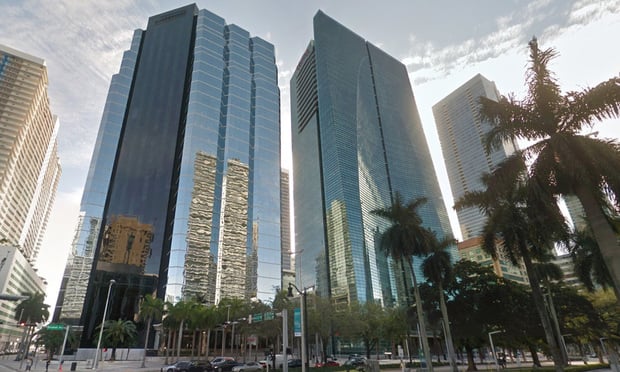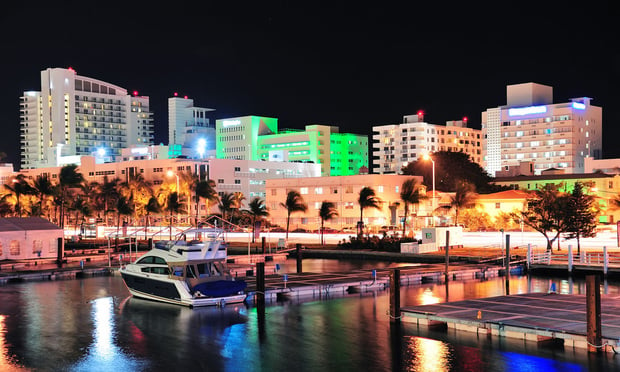MIAMI—While the limited service hotel segment is on a strong growth track, luxury hotels are still en vogue. The question is, what are today's travelers looking for from a luxury all-inclusive standpoint?
GlobeSt.com caught up with Diego Lowenstein, CEO of Lionstone Development, to get some insights in part one of this exclusive interview. What you learn from this second generation hotel developer might surprise you.
“We're keeping a close eye on luxury all-inclusive properties in the Caribbean, as we predict that hotel sector will flourish,” Lowenstein tells GlobeSt.com. “The biggest driver of this potential growth is brands beginning to move away from the cookie-cutter type approach of the past and toward a more unique, personalized experience.”
Why are brands doing this? Lowenstein has some thoughtful observations.
“Because today's luxury all-inclusive travelers are looking for value, as always, but will no longer settle for a mid-level experience just to get it,” he shares. “Instead, they're looking for all-inclusive properties to mirror the food and beverage offerings, amenities, and experiences they receive at the luxury hotel properties they are used to staying at.”
This is not necessarily a new revelation in the market. But some brands are more effective at executing what the market wants than others.
“The brands that are doing it right, like Hyatt Ziva and Zilara and the AM Resorts brands, are rejecting the 'standardization; of F&B, which replicates the same offerings in multiple resorts, for a more tailored approach that incorporates local flavors and preparations to provide a singular experience,” Lowenstein says. “This approach doesn't stop at F&B, though.”
Lowenstein notes all-inclusive resorts are also incorporating more luxury touches into their amenity and spa offerings to ensure travelers get a more customized, personal experience. Today, he says, all-inclusive properties are bringing more exclusive spa treatments—like hydrotherapy—in-house, establishing their own luxury spa brands, and offering high-end amenities like personal butlers, private lunge pools and in-room check-in to make guests feel like they are able to experience a truly private getaway, despite spending the majority of their time on-site.
“It's the brands that deliver an excellent product, and balance this value proposition with the ever-changing expectations of today's travelers—true hospitality and service execution—that will succeed in really transforming the sector from the all-inclusive our grandparents think of to the all-inclusive of the future,” Lowenstein concludes. Find out why Lionstone is still bullish on Miami.
MIAMI—While the limited service hotel segment is on a strong growth track, luxury hotels are still en vogue. The question is, what are today's travelers looking for from a luxury all-inclusive standpoint?
GlobeSt.com caught up with Diego Lowenstein, CEO of Lionstone Development, to get some insights in part one of this exclusive interview. What you learn from this second generation hotel developer might surprise you.
“We're keeping a close eye on luxury all-inclusive properties in the Caribbean, as we predict that hotel sector will flourish,” Lowenstein tells GlobeSt.com. “The biggest driver of this potential growth is brands beginning to move away from the cookie-cutter type approach of the past and toward a more unique, personalized experience.”
Why are brands doing this? Lowenstein has some thoughtful observations.
“Because today's luxury all-inclusive travelers are looking for value, as always, but will no longer settle for a mid-level experience just to get it,” he shares. “Instead, they're looking for all-inclusive properties to mirror the food and beverage offerings, amenities, and experiences they receive at the luxury hotel properties they are used to staying at.”
This is not necessarily a new revelation in the market. But some brands are more effective at executing what the market wants than others.
“The brands that are doing it right, like Hyatt Ziva and Zilara and the AM Resorts brands, are rejecting the 'standardization; of F&B, which replicates the same offerings in multiple resorts, for a more tailored approach that incorporates local flavors and preparations to provide a singular experience,” Lowenstein says. “This approach doesn't stop at F&B, though.”
Lowenstein notes all-inclusive resorts are also incorporating more luxury touches into their amenity and spa offerings to ensure travelers get a more customized, personal experience. Today, he says, all-inclusive properties are bringing more exclusive spa treatments—like hydrotherapy—in-house, establishing their own luxury spa brands, and offering high-end amenities like personal butlers, private lunge pools and in-room check-in to make guests feel like they are able to experience a truly private getaway, despite spending the majority of their time on-site.
“It's the brands that deliver an excellent product, and balance this value proposition with the ever-changing expectations of today's travelers—true hospitality and service execution—that will succeed in really transforming the sector from the all-inclusive our grandparents think of to the all-inclusive of the future,” Lowenstein concludes. Find out why Lionstone is still bullish on Miami.
Want to continue reading?
Become a Free ALM Digital Reader.
Once you are an ALM Digital Member, you’ll receive:
- Breaking commercial real estate news and analysis, on-site and via our newsletters and custom alerts
- Educational webcasts, white papers, and ebooks from industry thought leaders
- Critical coverage of the property casualty insurance and financial advisory markets on our other ALM sites, PropertyCasualty360 and ThinkAdvisor
Already have an account? Sign In Now
*May exclude premium content© 2024 ALM Global, LLC, All Rights Reserved. Request academic re-use from www.copyright.com. All other uses, submit a request to [email protected]. For more information visit Asset & Logo Licensing.









